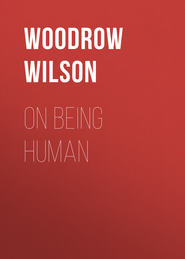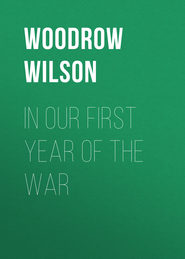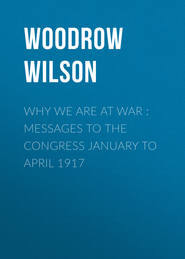По всем вопросам обращайтесь на: info@litportal.ru
(©) 2003-2024.
✖
The New Freedom
Автор
Год написания книги
2018
Настройки чтения
Размер шрифта
Высота строк
Поля
I believe, as I believe in nothing else, in the average integrity and the average intelligence of the American people, and I do not believe that the intelligence of America can be put into commission anywhere. I do not believe that there is any group of men of any kind to whom we can afford to give that kind of trusteeship.
I will not live under trustees if I can help it. No group of men less than the majority has a right to tell me how I have got to live in America. I will submit to the majority, because I have been trained to do it,—though I may sometimes have my private opinion even of the majority. I do not care how wise, how patriotic, the trustees may be, I have never heard of any group of men in whose hands I am willing to lodge the liberties of America in trust.
If any part of our people want to be wards, if they want to have guardians put over them, if they want to be taken care of, if they want to be children, patronized by the government, why, I am sorry, because it will sap the manhood of America. But I don't believe they do. I believe they want to stand on the firm foundation of law and right and take care of themselves. I, for my part, don't want to belong to a nation, I believe that I do not belong to a nation, that needs to be taken care of by guardians. I want to belong to a nation, and I am proud that I do belong to a nation, that knows how to take care of itself. If I thought that the American people were reckless, were ignorant, were vindictive, I might shrink from putting the government into their hands. But the beauty of democracy is that when you are reckless you destroy your own established conditions of life; when you are vindictive, you wreak vengeance upon yourself; the whole stability of a democratic polity rests upon the fact that every interest is every man's interest.
The theory that the men of biggest affairs, whose field of operation is the widest, are the proper men to advise the government is, I am willing to admit, rather a plausible theory. If my business covers the United States not only, but covers the world, it is to be presumed that I have a pretty wide scope in my vision of business. But the flaw is that it is my own business that I have a vision of, and not the business of the men who lie outside of the scope of the plans I have made for a profit out of the particular transactions I am connected with. And you can't, by putting together a large number of men who understand their own business, no matter how large it is, make up a body of men who will understand the business of the nation as contrasted with their own interest.
In a former generation, half a century ago, there were a great many men associated with the government whose patriotism we are not privileged to deny nor to question, who intended to serve the people, but had become so saturated with the point of view of a governing class that it was impossible for them to see America as the people of America themselves saw it. Then there arose that interesting figure, the immortal figure of the great Lincoln, who stood up declaring that the politicians, the men who had governed this country, did not see from the point of view of the people. When I think of that tall, gaunt figure rising in Illinois, I have a picture of a man free, unentangled, unassociated with the governing influences of the country, ready to see things with an open eye, to see them steadily, to see them whole, to see them as the men he rubbed shoulders with and associated with saw them. What the country needed in 1860 was a leader who understood and represented the thought of the whole people, as contrasted with that of a class which imagined itself the guardian of the country's welfare.
Now, likewise, the trouble with our present political condition is that we need some man who has not been associated with the governing classes and the governing influences of this country to stand up and speak for us; we need to hear a voice from the outside calling upon the American people to assert again their rights and prerogatives in the possession of their own government.
My thought about both Mr. Taft and Mr. Roosevelt is that of entire respect, but these gentlemen have been so intimately associated with the powers that have been determining the policy of this government for almost a generation, that they cannot look at the affairs of the country with the view of a new age and of a changed set of circumstances. They sympathize with the people; their hearts no doubt go out to the great masses of unknown men in this country; but their thought is in close, habitual association with those who have framed the policies of the country during all our lifetime. Those men have framed the protective tariff, have developed the trusts, have co-ordinated and ordered all the great economic forces of this country in such fashion that nothing but an outside force breaking in can disturb their domination and control. It is with this in mind, I believe, that the country can say to these gentlemen: "We do not deny your integrity; we do not deny your purity of purpose; but the thought of the people of the United States has not yet penetrated to your consciousness. You are willing to act for the people, but you are not willing to act through the people. Now we propose to act for ourselves."
I sometimes think that the men who are now governing us are unconscious of the chains in which they are held. I do not believe that men such as we know, among our public men at least—most of them—have deliberately put us into leading strings to the special interests. The special interests have grown up. They have grown up by processes which at last, happily, we are beginning to understand. And, having grown up, having occupied the seats of greatest advantage nearest the ear of those who are conducting government, having contributed the money which was necessary to the elections, and therefore having been kindly thought of after elections, there has closed around the government of the United States a very interesting, a very able, a very aggressive coterie of gentlemen who are most definite and explicit in their ideas as to what they want.
They don't have to consult us as to what they want. They don't have to resort to anybody. They know their plans, and therefore they know what will be convenient for them. It may be that they have really thought what they have said they thought; it may be that they know so little of the history of economic development and of the interests of the United States as to believe that their leadership is indispensable for our prosperity and development. I don't have to prove that they believe that, because they themselves admit it. I have heard them admit it on many occasions.
I want to say to you very frankly that I do not feel vindictive about it. Some of the men who have exercised this control are excellent fellows; they really believe that the prosperity of the country depends upon them. They really believe that if the leadership of economic development in this country dropped from their hands, the rest of us are too muddle-headed to undertake the task. They not only comprehend the power of the United States within their grasp, but they comprehend it within their imagination. They are honest men, they have just as much right to express their views as I have to express mine or you to express yours, but it is just about time that we examined their views for ourselves and determined their validity.
As a matter of fact, their thought does not cover the processes of their own undertakings. As a university president, I learned that the men who dominate our manufacturing processes could not conduct their business for twenty-four hours without the assistance of the experts with whom the universities were supplying them. Modern industry depends upon technical knowledge; and all that these gentlemen did was to manage the external features of great combinations and their financial operation, which had very little to do with the intimate skill with which the enterprises were conducted. I know men not catalogued in the public prints, men not spoken of in public discussion, who are the very bone and sinew of the industry of the United States.
I will not live under trustees if I can help it. No group of men less than the majority has a right to tell me how I have got to live in America. I will submit to the majority, because I have been trained to do it,—though I may sometimes have my private opinion even of the majority. I do not care how wise, how patriotic, the trustees may be, I have never heard of any group of men in whose hands I am willing to lodge the liberties of America in trust.
If any part of our people want to be wards, if they want to have guardians put over them, if they want to be taken care of, if they want to be children, patronized by the government, why, I am sorry, because it will sap the manhood of America. But I don't believe they do. I believe they want to stand on the firm foundation of law and right and take care of themselves. I, for my part, don't want to belong to a nation, I believe that I do not belong to a nation, that needs to be taken care of by guardians. I want to belong to a nation, and I am proud that I do belong to a nation, that knows how to take care of itself. If I thought that the American people were reckless, were ignorant, were vindictive, I might shrink from putting the government into their hands. But the beauty of democracy is that when you are reckless you destroy your own established conditions of life; when you are vindictive, you wreak vengeance upon yourself; the whole stability of a democratic polity rests upon the fact that every interest is every man's interest.
The theory that the men of biggest affairs, whose field of operation is the widest, are the proper men to advise the government is, I am willing to admit, rather a plausible theory. If my business covers the United States not only, but covers the world, it is to be presumed that I have a pretty wide scope in my vision of business. But the flaw is that it is my own business that I have a vision of, and not the business of the men who lie outside of the scope of the plans I have made for a profit out of the particular transactions I am connected with. And you can't, by putting together a large number of men who understand their own business, no matter how large it is, make up a body of men who will understand the business of the nation as contrasted with their own interest.
In a former generation, half a century ago, there were a great many men associated with the government whose patriotism we are not privileged to deny nor to question, who intended to serve the people, but had become so saturated with the point of view of a governing class that it was impossible for them to see America as the people of America themselves saw it. Then there arose that interesting figure, the immortal figure of the great Lincoln, who stood up declaring that the politicians, the men who had governed this country, did not see from the point of view of the people. When I think of that tall, gaunt figure rising in Illinois, I have a picture of a man free, unentangled, unassociated with the governing influences of the country, ready to see things with an open eye, to see them steadily, to see them whole, to see them as the men he rubbed shoulders with and associated with saw them. What the country needed in 1860 was a leader who understood and represented the thought of the whole people, as contrasted with that of a class which imagined itself the guardian of the country's welfare.
Now, likewise, the trouble with our present political condition is that we need some man who has not been associated with the governing classes and the governing influences of this country to stand up and speak for us; we need to hear a voice from the outside calling upon the American people to assert again their rights and prerogatives in the possession of their own government.
My thought about both Mr. Taft and Mr. Roosevelt is that of entire respect, but these gentlemen have been so intimately associated with the powers that have been determining the policy of this government for almost a generation, that they cannot look at the affairs of the country with the view of a new age and of a changed set of circumstances. They sympathize with the people; their hearts no doubt go out to the great masses of unknown men in this country; but their thought is in close, habitual association with those who have framed the policies of the country during all our lifetime. Those men have framed the protective tariff, have developed the trusts, have co-ordinated and ordered all the great economic forces of this country in such fashion that nothing but an outside force breaking in can disturb their domination and control. It is with this in mind, I believe, that the country can say to these gentlemen: "We do not deny your integrity; we do not deny your purity of purpose; but the thought of the people of the United States has not yet penetrated to your consciousness. You are willing to act for the people, but you are not willing to act through the people. Now we propose to act for ourselves."
I sometimes think that the men who are now governing us are unconscious of the chains in which they are held. I do not believe that men such as we know, among our public men at least—most of them—have deliberately put us into leading strings to the special interests. The special interests have grown up. They have grown up by processes which at last, happily, we are beginning to understand. And, having grown up, having occupied the seats of greatest advantage nearest the ear of those who are conducting government, having contributed the money which was necessary to the elections, and therefore having been kindly thought of after elections, there has closed around the government of the United States a very interesting, a very able, a very aggressive coterie of gentlemen who are most definite and explicit in their ideas as to what they want.
They don't have to consult us as to what they want. They don't have to resort to anybody. They know their plans, and therefore they know what will be convenient for them. It may be that they have really thought what they have said they thought; it may be that they know so little of the history of economic development and of the interests of the United States as to believe that their leadership is indispensable for our prosperity and development. I don't have to prove that they believe that, because they themselves admit it. I have heard them admit it on many occasions.
I want to say to you very frankly that I do not feel vindictive about it. Some of the men who have exercised this control are excellent fellows; they really believe that the prosperity of the country depends upon them. They really believe that if the leadership of economic development in this country dropped from their hands, the rest of us are too muddle-headed to undertake the task. They not only comprehend the power of the United States within their grasp, but they comprehend it within their imagination. They are honest men, they have just as much right to express their views as I have to express mine or you to express yours, but it is just about time that we examined their views for ourselves and determined their validity.
As a matter of fact, their thought does not cover the processes of their own undertakings. As a university president, I learned that the men who dominate our manufacturing processes could not conduct their business for twenty-four hours without the assistance of the experts with whom the universities were supplying them. Modern industry depends upon technical knowledge; and all that these gentlemen did was to manage the external features of great combinations and their financial operation, which had very little to do with the intimate skill with which the enterprises were conducted. I know men not catalogued in the public prints, men not spoken of in public discussion, who are the very bone and sinew of the industry of the United States.











